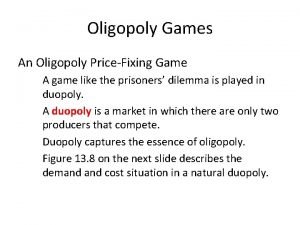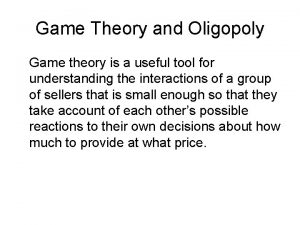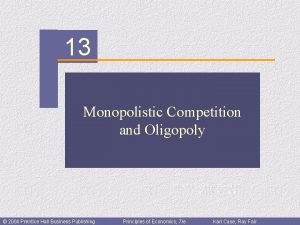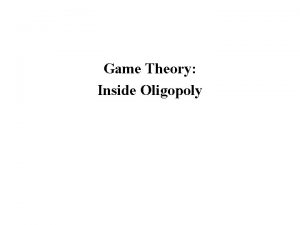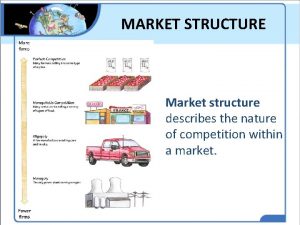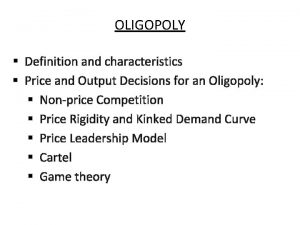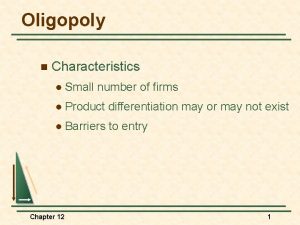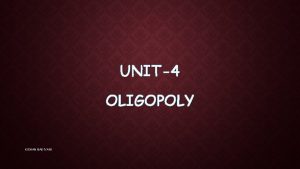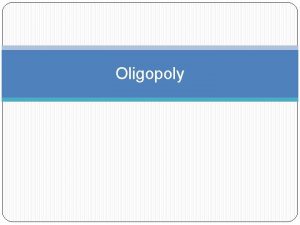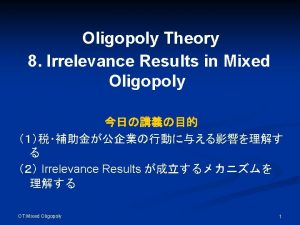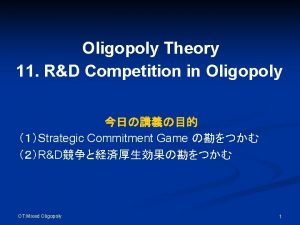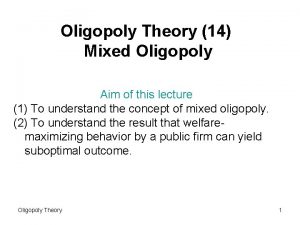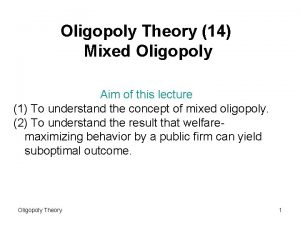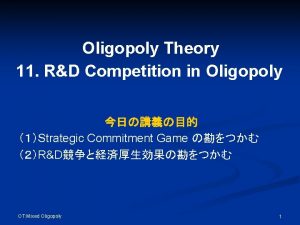Game Theory and Oligopoly Game theory is a












- Slides: 12

Game Theory and Oligopoly Game theory is a useful tool for understanding the interactions of a group of sellers that is small enough so that they take account of each other’s possible reactions to their own decisions about how much to provide at what price.

A Demand Schedule for Water Suppose the marginal cost is zero. What would the price be under monopoly? Under perfect competition? With two sellers in the market? Copyright © 2004 South-Western

Price and Quantity Supplied Under Monopoly and Perfect Competition – The price of water in a perfectly competitive market would be driven to where the marginal cost is zero: • P = MC = $0 • Q = 120 gallons – The price and quantity in a monopoly market would be where total profit is maximized: • P = $60 • Q = 60 gallons – How much will each of two sellers provide and what price will each charge?

Jack and Jill Oligopoly Game Jack’s Decision Sell 40 Gallons Jill’s Decision Sell 30 Gallons Jack gets $1, 500 profit Jack gets $1, 600 profit Jill gets $2, 000 profit Jack gets $2, 000 profit Jill gets $1, 500 profit Jack gets $1, 800 profit Jill gets $1, 800 profit The Monopoly Optimum Copyright© 2003 Southwestern/Thomson Learning

Will Jack and Jill Get to the Monopoly Optimum? • The prisoners’ dilemma provides insight into the difficulty in maintaining cooperation. • Often people (firms) fail to cooperate with one another even when cooperation would make them better off.

The Prisoners’ Dilemma • The prisoners’ dilemma is a “game” between two people awaiting trial for a crime they have committed, but for which the DA has insufficient evidence to convict. It illustrates why cooperation is difficult to maintain even when it is mutually beneficial. • The dominant strategy is the best strategy for a player to follow regardless of the strategies chosen by the other players. • A dominant strategy will not always exist.

The Prisoners’ Dilemma Dominant strategy Bonnie’ s Decision Confess Bonnie gets 8 years Remain Silent Bonnie gets 20 years Confess Clyde gets 8 years Clyde’s Decision Bonnie goes free Clyde goes free Bonnie gets 1 year Remain Silent Clyde gets 20 years Clyde gets 1 year Cooperative solution Copyright© 2003 Southwestern/Thomson Learning

Jack and Jill Oligopoly Game Dominant Strategy Jack’s Decision Sell 40 Gallons Jill’s Decision Sell 30 Gallons Jack gets $1, 500 profit Jack gets $1, 600 profit Jill gets $2, 000 profit Jack gets $2, 000 profit Jill gets $1, 500 profit Jack gets $1, 800 profit Jill gets $1, 800 profit Cooperative solution = Monopoly Optimum Copyright© 2003 Southwestern/Thomson Learning

The Nuances of Self Interest • Self interest in isolation (the dominant strategy) is different from self interest in a cooperative context. But both a dominant strategy and a cooperative strategy reflect the self interest of the players. No question here of altruism, duty, obligation, or any other motive than the hedonistic utility of the players.

Another Concept of Equilibrium for an Oligopoly • A Nash Equilibrium is a situation in which interacting economic agents each choose their best strategy given the strategies that all the others have chosen. And these strategies are mutually compatible.

Jack and Jill Oligopoly Game Jack’s Decision Sell 40 Gallons Jill’s Decision Sell 30 Gallons Jack gets $1, 500 profit Jack gets $1, 600 profit Jill gets $2, 000 profit Jack gets $2, 000 profit Jill gets $1, 500 profit Jack gets $1, 800 profit Jill gets $1, 800 profit Copyright© 2003 Southwestern/Thomson Learning

Jack and Jill Oligopoly Game Nash Equilibrium Jack’s Decision Sell 40 Gallons Jill’s Decision Sell 30 Gallons Jack gets $1, 500 profit Jack gets $1, 600 profit Jill gets $2, 000 profit Jack gets $2, 000 profit Jill gets $1, 500 profit Jack gets $1, 800 profit Jill gets $1, 800 profit Copyright© 2003 Southwestern/Thomson Learning
 Oligopoly
Oligopoly Oligopoly game theory matrix
Oligopoly game theory matrix Oligopoly board game
Oligopoly board game Payoff matrix oligopoly
Payoff matrix oligopoly Game theory inside oligopoly
Game theory inside oligopoly Oligopoly board game
Oligopoly board game Pure competition advertising
Pure competition advertising Price and output determination under oligopoly
Price and output determination under oligopoly Pros and cons of monopolistic competition
Pros and cons of monopolistic competition Chapter 7 section 3 monopolistic competition and oligopoly
Chapter 7 section 3 monopolistic competition and oligopoly Oligopoly definition and characteristics
Oligopoly definition and characteristics Oligopoly examples
Oligopoly examples Barriers to entry oligopoly
Barriers to entry oligopoly

